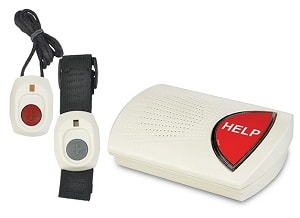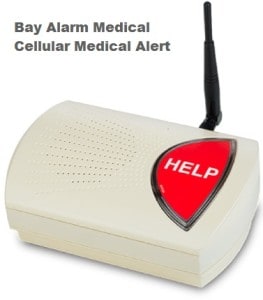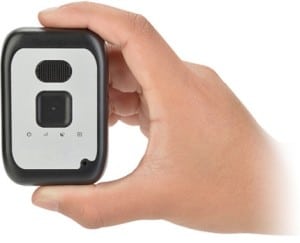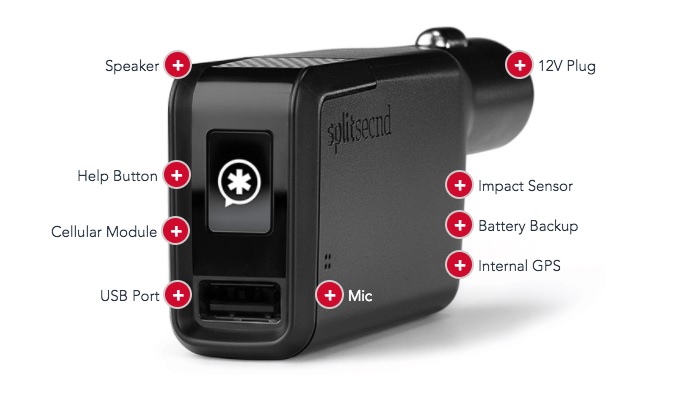Last Updated on September 4, 2020
Bay Alarm Medical offers three main alert systems for seniors who may be living alone, or homes that want the assurance of monitoring operators standing by in case of emergencies. In this article, we will go over what these three systems are, and who they are best recommended for.
The systems are: In-Home Medical Alert System, In-Home Cellular Alert System, GPS Mobile Help Button and In-Car Medical Alert. Let’s take a look at each one in detail.
 Click to Call Bay Alarm Medical 1-855-397-9964
Click to Call Bay Alarm Medical 1-855-397-9964
In-Home Medical Alert System
The Bay Alarm Medical in-home medical alert system is popular, easy to use and lowest in price.
Recommended for seniors who want coverage while they are at home. A home phone line is needed. Works with traditional landlines, major VoIP and cable phone lines as well. If you do not have a home phone line, look into the In-Home Cellular Alert System described below.
Base Station Unit
This personal emergency response system comes with a base station unit and a help button. The base station requires a traditional landline phone connection. If you do not have a traditional landline, the unit will also work with most well known VoIP and cable phone lines. All you need to do is plug in the phone line and the power adapter. Then, you are all set to push the help button and test out your system. This system is extremely easy to install and use.
Disclosure: We receive referrals commissions for purchases made (details).
Speaker and Microphone
A great feature of the base station is its sensitive built-in speaker and microphone. Their high-output and ultra sensitivity ensures amazing and clear communication during an emergency. You will need to test things out, but it’s quite possible to be in another room from where the base station unit is placed and still communicate with the monitoring agent.
The base station works on a reliable and proven technology. What’s more is that it’s portable (for in-home use). So, you can easily carry it with you when you’re on a vacation or visiting family or friends in another state. Bay Alarm Medical offers its services all over the USA including Hawaii and Alaska.
Watch Bay Alarm Medical Video Review >>
Help Button
The help button is major component of the in-home medical alert system – it’s the piece that is worn by the senior user. It’s comfortable, sleek and light-weight. It can be worn around neck as a necklace or as a wristband.
Designed to be waterproof, elderly users can wear their help buttons all the time, including when they go to the bath or shower areas. This is important, as the risk for elderly falls are usually highest in the bathroom.
The help button has a wide coverage of up to 1,000 feet. Usually, this wide coverage includes the front and backyards of your home. It also comes with a lifetime warranty. The help button can last for up to 5 years without the need to recharge it. However, if the battery starts to run low, the button is designed to send an alert to the company’s monitoring station. They will immediately ship a new button free of cost.
Read the Full Bay Alarm Medical Review >>
In-Home Cellular Alert System
The Bay Alarm Medical In-Home Cellular Alert System works just like their In-Home Medical Alert System described above, except that it does not need to hook up to an external phone line. For more information, see our review of Cellular Medical Alert Systems.
Recommended for seniors who want coverage while they are at home. No home phone line is needed. No cell phone or cell phone line is needed.
No Home Phone Line Needed, No Cell Phone Needed
This system is great for residents who don’t have a traditional landline in use anymore. No personal cell phone line or cell phone is needed either.
The base station unit is powered by AT&T’s cellular network. You don’t need to be a current AT&T subscriber to use the in-home cellular alert system. You don’t need to own a cell phone to use this either. (Even if you have cell phone service from AT&T or another service provider, you won’t be able to connect your personal cell phone service to the base station unit.)
Disclosure: We receive referrals commissions for purchases made (details).
Similar To Standard In-Home Medical Alert
Like the in-home medical alert system, the cellular system also comes with a base station and the help button. It is easy to install and use.
Both the alert systems are available with additional accessories like automatic fall detection, vial of life, lockbox and premier protection plan. While the vial of life has no additional cost, the others come at either a one-time cost or a monthly cost.
Read the Full Bay Alarm Medical Review >>
GPS Mobile Help Button
Just because a person ages, it doesn’t mean they have a sedentary lifestyle. This is why the GPS mobile help button by Bay Alarm Medical can be your best friend. Whether you’re out with your friends or at the grocery store, this alert system powered by AT&T 3G cellular can prove to be very handy.
Recommended for seniors who require coverage while they out of their homes. If you also like in-home coverage, you can get their in-home system included at a discount.
It’s compact and lightweight design makes it easy to carry around all the time. If you need help anywhere and at anytime, you simply need to push the button on the device (see video). The Bay Alarm Medical monitoring operators will initiate a conversation with you.
If required, they can also contact your friends, neighbors, family and/or your local emergency services. The device is GPS enabled, making it easy to confirm the user’s whereabouts when needed.
A single charge ensures it functions for up to 72 hours. Users will need to recharge it rather frequently in order to use it on a daily basis. In contrast, the battery life of the in-home systems’ (described above) alert buttons are designed to last for several years.
Read the Full Bay Alarm Medical GPS Mobile Help Button Review >>
The accessories included with the GPS mobile help button are a USB charger, charging pod, carrying case with a belt clip as well as a lanyard. The optional accessories include vial of life, lockbox and an extended service plan.
To complement their mobile medical alert device, Bay Alarm Medical offers customers access to an online Caregiver Tracking portal that displays the user’s GPS location. This allows children and caregivers of the senior to keep track of where the senior is and be alerted if the senior has moved out of an area (geofencing). The is based on information transmitted through the GPS mobile medical alert device.
 Click to Call Bay Alarm Medical 1-855-397-9964
Click to Call Bay Alarm Medical 1-855-397-9964
In-Car Medical Alert Device
Bay Alarm Medical introduced an in-car medical alert with GPS in the summer of 2018. Road safety is a topic of major concern for most families. Perhaps you are worried about the safety of your loved ones or need a support system to rely on in case the driver and passengers are stuck by the roadside.
Bay Alarm Medical’s in-car GPS medical alert is equipped with an emergency alert help button and transmits GPS data. It also has a crash sensor that will automatically send off a crash alert when it detects that a crash has happened.
Read the Full Bay Alarm Medical In-Car Medical Alert Device Review >>
The various Bay Alarm Medical alert systems allow the elderly can stay safe at home or away from home. Bay Alarm’s medical alarm systems are definitely worthy of consideration. With a full product line and various add-on accessories and options to choose from, most seniors have no trouble finding the right configuration to meet their needs.
Disclosure: We receive referrals commissions for purchases made (details).
To compare Bay Alarm Medical with other companies, check out our Medical Alert Systems Reviews section.
Disclaimer: While every effort has been made to ensure the accuracy of the information contained in this guide, the information is supplied without warranties of any kind. We advise all readers to do careful due diligence before purchasing. Take time to visit the company’s website or speak with their representatives.
- Bay Alarm Medical In-Home Cellular Response Speed 46% Faster in 2023 - July 5, 2023
- Medical Alert Systems For Landlines - November 20, 2022
- The Truth About Long-Range Medical Alert Systems - May 1, 2022
In a hurry? Leave us your email, we’ll follow-up with the best tips.




